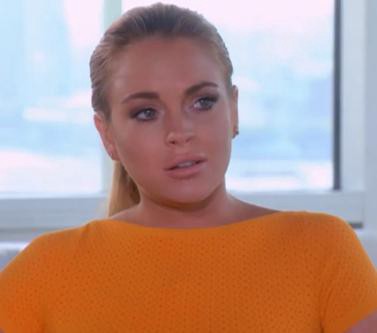Saying Sorry Is a Pretty-Girl Trick
by Sarah Nicole Prickett

When I count the times I’ve taken trains without tickets, or cabs without cash, or snuck onto subways with an open bottle of wine, or nicked $8 nailpolish from Rite-Aid while smiling at the security guy on my way out, or paid rent/bills/my friends back late, or been the last person on an airplane with luggage 10 tons over the limit, or crossed the Canada-US border without a passport, or climbed the fences of public pools or parks or private property while high on coke or molly or mushrooms or, once, all of the above, it occurs to me that even if Lindsay Lohan is forgiven her sins I’m still on the hook for mine. She has done nothing categorically worse or more careless than I have, or — all evidence considered — would have. It’s only a matter of scale.
Lohan is larger than life in the realest sense. She has never seemed removed from, or better than, or above life, the way other very famous or beautiful people do. Even her first name is neither classic nor cool nor strange, just a hundred percent Suburban America. She is the movie star of my demographic: A pretty, funny, once-precocious and precariously spoiled white girl whose hopes and feels define the upper edge of “millennial.” When Mean Girls made her a $7-million-per-movie actor, my cohort’s aims for the future were highest. Two or three years later, we had graduated or dropped out and were watching the job market crash like a borrowed Porsche.
I remember betting cash that LiLo would win an Oscar by 30. I also thought I’d be out of debt, on a book tour, and running a six-minute mile every day by then.
Watching Lindsay live on Oprah Sunday night, while my fiancé sat in the other room screening Almodovar and searching “how to un-propose” on his phone, I felt no sympathy, no pity, only the steady sick pulse of recognition. (Raise your hand if you’re unable to count on it the number of close personal friends who’ve done coke less than, as Lindsay swore, “10 or 15 times.”) I think it’s the first time I had watched OWN. Maybe I’m not a fan. It seemed right, though, that Lindsay would be atoning for all of us across from Oprah, not Barbara or Diane. The national conscience isn’t a white bitch.
Sure, a generation of liberal feminists told us to work hard and be selfish and buy ourselves diamond rings and “support each other’s choices :)” while remaining wholly oblivious to those who by birth or fortune have fewer choices than we do, or different choices, and in consequence we have a credenda that permits full-fledged social media campaigns to be waged against… catcalling, and 22-year-old Bard College graduates named Samantha to sue for stop-and-frisk, and Bushwick artists to reframe unsolicited dick pics as “assault,” while colorless, apolitical (albeit sometimes great) TV shows are titled Girls and an entire summer is spent debating the sexist implications of a Robin Thicke song versus our right to dance to a Robin Thicke song that isn’t even good — like have you tried actually listening to “Blurred Lines,” looking in the mirror while listening, and being like, this is my problem in life? I recommend it.
Lil women like me remain “addicted to the chaos” of Liloland not because her problems — with liquor, pills, bills and rent, relationships, “the work-life balance” — are so unlike our own, but because they’re exactly like our own, only writ big enough to seem very, very bad, and therefore interesting. They’re not — “anymore,” as Lohan said to Oprah, and maybe they never were. Scale is one thing; perspective is the important thing. That’s why Lohan’s best line on Oprah was the one she never said: I’m sorry. Whether clichéd and true or clichéd and not true, the things she said were only ever about doing better.
With great privilege comes an equally great ability to be irresponsible and yet succeed, be cared about, get out of jail free. The other week my friend Sheila told me I should stop apologizing and not start again. “Saying sorry all the time is a pretty-girl trick,” she wrote. Then she said nice stuff that doesn’t matter, because the/my point is that being a girl — pretty or not-pretty, white or not-white — is still tougher than being a boy, and yet other things have been far too easy for too many of us. Certain things have not been risked at all. In the commercial breaks, I scrolled through the aftermath of #SolidarityisforWhiteWomen until I couldn’t roll my eyes at another white girl apologizing publicly. “Sorry” is always saying “please still like me.” Doing better is more like deserving it.
Note: An earlier version of this post mistakenly linked to the tumblr blog Catcalled instead of Catcalled NYC.
Previously: The “Real Thing” of Women’s Writing: A Note for Stephen Marche
Sarah Nicole Prickett is a contributing editor at The New Inquiry and a writer for The Globe & Mail, Hazlitt, Vice, BULLETT, The Aesthete, and more. She lives in Chinatown and tweets at @snpsnpsnp.